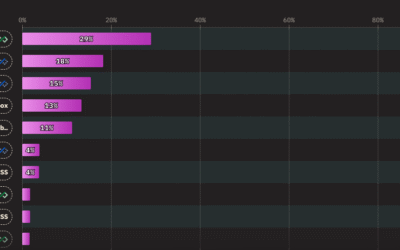
Today web designers are working under increasing pressure as clients want their projects to be completed at a much faster rate than before. Consequently, many developers use smart tools which facilitate the process of design and development. But it’s not just about what you use at work, but how you approach it too. Here are 7 key tips to help you in becoming more productive and boost your career in web design.
1. Learn how to prioritize
It’s clear that most designers have more tasks to complete than they have time to do it. Don’t let a surge of responsibilities immobilize you or make you lose time writing urgent to-do lists. What comes in handy here is the ability to accurately prioritize your tasks – instead of worrying about what you should do next or what you should be doing right now, prepare a schedule and stick to it.
Even if you’ve got a million things asking for your attention at the same time, you won’t be able to get anywhere with your project if you cannot focus on one issue at a time. If you spend all your time worrying whether you can complete the project, you won’t get anything done either.
This is a skill which can be developed in time, but here’s a strategy which will help you get it right sooner. In the morning go straight to your email inbox and after checking it carefully, judge which issues should be dealt with today. Write down each task you plan to complete today and then put them in order – it’s best to put the most challenging or least appealing tasks at the front. Shut off your email and don’t check it until lunchtime – you’ll only get distracted.
2. Stop multitasking
A natural component of great prioritization is a halt in multitasking. Even if many job descriptions still require candidates to boast this ability, research so far proves that multitasking actually makes us unproductive. Our brains can properly focus on one task at a time and if it’s an important one, thinking about something else might seriously affect your performance.
Multitasking understood as jumping from one task to another is your enemy. Still, web developers often find themselves pulled away from their activity to immediately jump to the next one. It’s in your best interest to force a policy where you can only be asked questions through email, not phone – or that fixing bugs is something you do only in afternoons.
3. Turn off your email
This is an incredibly smart piece of advice since email alerts are the single most important factor in throwing you off rhythm when working on a project. Most developers simply switch off their email once they’re done checking it in the morning and don’t open it again until a specific hour.
If a sound signal from your inbox makes you jump and you immediately want to check the message, you’re being a slave to your email and sabotaging your own productivity. The truth about emails is that the majority of them aren’t urgent and nobody expects you to respond straight away. If you’re too bothered about turning off the sound alert, consider setting your email to pile messages once every hour.
4. Take regular breaks
Breaks are wonderful to our productivity, but many people are still convinced that the more time they spend glued to their screens the more productive they will grow. The truth is that your brain needs a moment off – use the break to have a healthy snack, take a walk, stretch or do a few desk exercises. There’s nothing better than increased blood flow bringing oxygen to your brain.
Analyze your dietary habits to see which foods give you a steady level of energy and which ones tend to make you sluggish. Choose your lunch break at an hour which suits you – many professionals like the quiet of lunchtime at the office and choose to have their lunch a bit later than others.
Make sure to drink lots of water since dehydration is your number one enemy in busy and stress-inducing working environments. Taking regular breaks and eating well, you’ll ensure that your body is in top form to get lots of things done every day.
5. Rest your brain
It’s one thing to take regular breaks and another to know how to rest your brain. We’re receiving stimuli from all over the place today and our brains have to process tons of information every hour, so you can imagine that an overload is a real possibility.
If you work for too many hours and don’t get enough sleep or rest, your productivity will be affected. You’re not a robot and your body cannot perform on maximum levels all the time. You need to know when it’s time to shut down your computer and go home – trust yourself to realize which tasks are better done when you’re fully wake and at top form.
6. Ensure top security
This is a practical advice which might seem obvious, but to many professionals it isn’t – in fact, the question of device security is most often ignored. Doing proper backups and updating your antivirus software will guard you against losing all your work, which would be a disaster.
If you think that such disasters cannot happen to you, trust me they can. Back your stuff up (automatically or manually) on your server, USB keys or a secure online storage. Keep your work computer orderly and avoid installing hundreds of programs you don’t need.
If you code, use version control software (think CVS) to take copies of your file at key points. And remember to save your work every few minutes to avoid losing it at a critical moment.
7. Take care about your comfort
You probably spend the majority of your time chained to a desk with your eyes glued to a screen, so make sure that this working environment is as comfortable as it can get. If your surroundings make it harder to work, your productivity will suffer.
Remove all things that can potentially distract you or make it harder for you to complete your tasks. Many people use headphones to shut off background noises – choose a pair of high quality and prepare playlists beforehand.
Have a look at your work station – does your desk, chair and keyboard all help you at work? Your back should be upright and the top of your monitor should be located at your eye level. Your feet should rest easily on the floor without causing tension in your legs, and your spine should be straight, not hunched forwards or twisted – this is why backache happens.
Have you got any productivity tricks up your sleeve? Share them in comments and help web designers to grow more productive and way more happier doing their jobs.





0 Comments